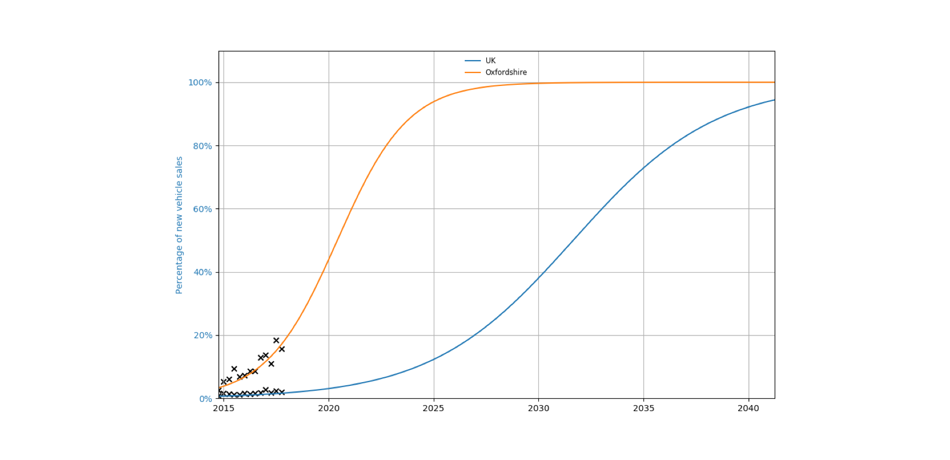PnC Pilot
Park & Charge
Park & Charge Pilot – October 2019 to March 2021
The Park & Charge (PnC) Pilot builds on the PnC feasibility study output to scope a large-scale demonstrator project to provide charging infrastructure for EV owners who do not have access to home charging with minimal disruption to the public.
Figure 1 shows the EV sales as a percentage of new vehicles sales in Oxfordshire and the UK (Data source: DfT, December 2018). From the figure it can be observed that Oxfordshire is ahead of the UK in EV sales percentage and about 50% of new vehicles sold in Oxfordshire would be electric by 2021.
As Electric Vehicle take-up grows, the infrastructure to support it is lagging behind, mainly due to costs and difficulties in finding suitable charge point locations. The feasibility study recognises the challenge that providing on-street EV Charging & Parking (EVCP) represents and takes a holistic view of addressing it. The study analyses the potential for an integrated intelligent solution to the lack of on-street EVCP in towns and cities.
This project trials charge points in car parks for potential EV users with no access to home charging and at nominal disruption to the public. The project seeks to de-risk the business model for large scale charge point roll out by offering data to prove use cases and commercial viability. Park and Charge offers a novel statistical algorithm to select suitable car park sites for charge point use, considering long term payback, likely use, ideal site location and multiple use case revenue streams.
Local Authority engagement is crucial to facilitate charge point take up. This project has active engagement from all five Local Authorities in Oxfordshire that all have a desire to enable charge point roll out but are struggling to justify the expenditure. The charge points proposed in this project offer technically advanced features such as pre-booking, user alerts, V2G, dynamic billing and dynamic charging, these features will ensure that this project is future-proofed in order to allow a longer payback period. This project benefits from a detailed user survey conducted in stage 1 that highlights user concerns and reasons for slow take-up. Major concerns to be addressed by this project are interoperability, ease of use and accessibility of charge points to different social groups. The output of this project will be insights in user behaviours regarding Park and Charge as well as a validation of the business model that can provide investors with the confidence to facilitate rapid scale-up. Park and Charge will enable multiple use cases with a subscription for users who wish to Park and Charge over-night and ad-hoc use for those users who just want to turn up and charge, including a variety of car park management use cases in a city, town and village environment.
A key workstream for this project will be to determine the legal frameworks required in order to enable local authorities and investors to get what they need in order to satisfy differing operational requirements and work together. This project will link into the other innovations occurring in Oxfordshire - Project LEO; in order to allow dynamic Energy pricing, project V2Go; to learn from 2-way data between charge point and grid and GoUltralow; to learn lessons from on-street charge point use. This project will form a key part of the Living Laboratory which the Oxfordshire local industrial strategy is built upon.

Figure 1: EV sales as a percentage of new vehicle sales in Oxfordshire and the UK
“
EV sales as a percentage of new vehicle sales in Oxfordshire by Sivapriya Bhagavathy, Constance Crozier and Malcolm McCulloch is licensed under a Creative Commons Attribution-NoDerivatives4.0 International License.”
Partners
The project is lead by Zeta (provider of electric vehicle charging hardware). The other partners are Oxfordshire County Council, SSE Enterprise, [ui!]UK (provider of software solutions), Energy and Power Group, University of Oxford and Transport Studies Unit, University of Oxford.
